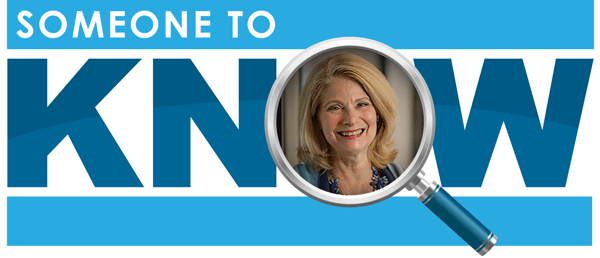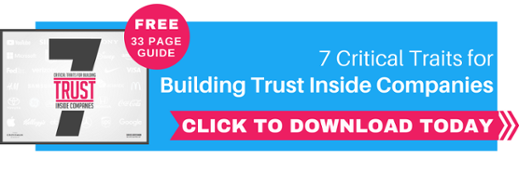January 9, 2019
Someone to Know: Q&A with Gail Golden Consulting, Principal Gail Golden
Written by:
David Grossman
Gail Golden has been a highly sought-after psychologist and leadership consultant for over 25 years. With a Ph.D. in clinical psychology, she ran a fulltime psychology practice before quickly finding her passion in helping leaders, teams, and organizations lead effectively. Among many insights here, Gail helps us confront the unconscious biases we face as leaders, and challenges us to think differently about our pursuit of the perfect work/life balance. Most critically, Gail offers terrific guidance for curating the life you truly want.

Q&A with Gail Golden, MBA, Ph.D.,
Principal of Gail Golden Consulting, LLC
Q: I have a tremendous amount of respect for you in the work that you do today as a consultant. I know you’ve got an important and helpful background in psychology. And so I’m curious: how did you get started?
A: I started out by getting a Ph.D. in clinical psychology. For the first half of my career, I worked in a fairly traditional psychology private practice, working with individual clients, families, and couples, and teaching at the local university. Then I began to get some experience with consulting to organizations. Mid-career, I began to realize that the clinical work was not engaging me in the same way that it had been. I became very interested in how psychology might be helpful to leaders in businesses and in not-for-profit organizations. I wanted to take what I had learned about human behavior and transfer it to address a different set of problems. I realized I needed to learn a lot more about business, so I went back to school for my MBA. Since 2003, I have worked exclusively in the leadership consulting space. It’s been an exciting process of doing exactly what I had hoped, which is blending together my psychological insight and knowledge with my business acumen to help individual leaders, teams, and whole organizations lead more effectively. While bringing their strategy to life, I can also help them make more money.
Q: I know you talk a lot about the psychology of leadership. How do you think about that and how does that inform your work and the results that you get?
A: The science of psychology has taught us a lot about what makes human beings effective, what gets in our way, and how we make decisions. For example, there’s a lot of recent research about unconscious biases that affect decision-making. In fact, a couple of people have won Nobel Prizes by applying this work to economics. We all like to believe that our decision-making processes are very rational, but there is now abundant evidence that there are predictable mistakes we make as individuals and as leaders when we’re making decisions. Knowledge of that research and helping leaders to understand and become more aware of how those biases will undermine good decision-making is one example of how psychology can be a very powerful tool for business leaders.
Another big area is emotional intelligence. We all know people who are very smart, who can crunch the numbers, look at a spreadsheet, conceptualize and theorize, but who are also clumsy, awkward, or destructive in their relationships with other human beings. Helping those leaders to develop their emotional intelligence, to know themselves better and to lead other people better, can vastly improve a leader’s ability to be truly effective.
Q: I’m curious, Gail, about this idea of predictable mistakes that we make. What might be an example of that, a mistake that you often see as you work with leaders?
A: We know, for example, about the recency effect. The most recent thing you’ve heard tends to have an outsize impact on your decision-making. Let’s say you’ve just read a Harvard Business Review article about a new approach to identifying high-potential leaders in your organization. Chances are you are going to be unduly influenced by that most recent article. In fact, there may be five other very good ways to identify high-potential leaders. So it’s important to take a step back and not just think about the most recent article you’ve read but make sure that you’re reviewing some of the other new developments in this area. That would be a way to consciously interfere with the recency effect.
Where the effect of bias can be particularly pointed is when we look at the selection of talent and the unconscious biases that we have around gender, race, age, body size, and all kinds of things that have nothing to do with performance. Most of us like to believe we don’t have any biases, but the reality is that almost nobody is free of them. I help leaders become aware of those biases and then consciously work to counteract them.
There’s a famous example from the world of symphony music. If you looked at a symphony orchestra from maybe 30 years ago, it was almost entirely men. That was because everybody “knew” that men played more forcefully and vigorously and were technically better than women, even at the highest levels of expertise. That was until a woman, a French horn player who was trying to get a seat in the New York Philharmonic, asked to have just the initial audition behind a screen. So the judges listened to a group of French horn players and one was clearly stronger than all the others. When the screen came down, it was her, and they were all shocked. Since then, typically the first round of symphony auditions is done behind a screen, and now there are a lot more women playing in orchestras than there used to be.
Q: So are we continuing to learn similar things about our beliefs and thoughts that help advance the ways that we think and work?
A: Yes, I think that’s absolutely right. When I first made the switch from clinical psychology – which is all about helping people to get to know themselves better – into consulting with business leaders, many of my colleagues really emphasized the importance of self-awareness. At the beginning I was a little skeptical. I wasn’t sure self-awareness was the most important thing for business leaders. However, over the 15 years that I’ve been doing this work exclusively, I have come more and more to appreciate that a leader who is not self-aware is almost never an effective business leader. Unless we have that self-awareness, we make foolish mistakes and overvalue our abilities.
This also explains why coaching has very much increased, in both popularity and impact, over the last few decades. We’ve realized that just like in sports, you don’t give a coach to an athlete just because the athlete is screwing up. You give coaches to elite athletes to help them continue their high-level performance and raise it to even higher levels. In fact, there’s a coaching organization that talks about coaching “corporate athletes.” They are referring specifically to senior leaders who have the same kinds of performance demands that athletes do, just not in the physical sense. Coaches are becoming more and more accepted in the corporate world.
Q: I understand that you are now writing a book that shares some of your coaching insights?
A: In my work with senior executives, almost universally there is a challenge when it comes to work/life balance. The challenge is, “How on earth do I fit into my day the multitude of things that I’m not only supposed to do, but I’m supposed to do extremely well?” That includes not only professional demands, but also demands in my personal life and in looking after myself. This work/life balance thing comes up repeatedly, and the more I talked about it with people, the more convinced I became that it was a useless concept. Nobody has a balanced life. However, lots of us believe that other people do, and that makes us feel inferior and ineffective. When you look really at other people’s lives, you find that many people, even highly productive people, don’t have balanced lives. Ultimately, that balancing ideal wasn’t working for me or for my clients.
Then one day, I started thinking about the concept of curation. If you think about what a curator in a museum does, he or she curates a collection of wonderful things. However, if you try to make an exhibit that has all of the paintings, it doesn’t work. They’ll be piled one on top of another, and it won’t tell a story or create a message. A curator has to look at the collection and decide what a particular exhibit is trying to do, what pieces belong, and how to arrange them so that people’s attention will be drawn in. And I thought, that’s what we need to be doing with our lives - not trying to balance everything, but curating.
When I think about curating my life, it means some key things to me. First, it’s figuring out what’s really important to me, what matters at this particular time in my life. This will change over my lifespan. In other words: What is my current “exhibit” about? Then it’s about looking at all the things I’m doing and figuring out what I’m going to say no to. Some activities are perfectly good and worthwhile, but right now, they don’t fit in my “exhibit.” So, I say no. That doesn’t mean that I throw the activity away. I just put it in the backroom, the same way that the curator stores paintings that didn’t make it into their exhibit this time.
The second bucket is choosing which activities I’m not going to be excellent at, just good enough. This is really, really hard for most people, because we’re all taught not to do something if you can’t do it right. So we all try to give every activity 100 percent, but that’s just not possible. The fact is, most of what we do, we do just “good enough.” So, rather than feeling ashamed or apologetic about that, be intentional about it. If cooking is not your thing, then be a mediocre cook, or order in. You don’t have to be a great cook. If your life is very full right now and you don’t have a lot of time to go out and give presentations about your work, then say, “No, thank you” to the invitations to speak.
If you say no to some activities and you make conscious choices about how to be “mediocre” about others, you will have the energy left to invest in the things you want to be great at: the things that really define who you are, the things that are your legacy, things that really matter to you. You will not be able to be great at those things if you’re wasting your energy trying to be great at the stuff that only deserves mediocrity, or things you could just as well say no to. It’s a simple concept, but it’s hard to put into practice. Most of us don’t like to say no, especially to colleagues and to people who care about us and to people who need our time and energy. And most of us don’t like admitting we’re going to be mediocre at anything. But without making those choices, it’s almost impossible to be great. That’s the core of the process of curating your life. I’ve been experimenting with this concept for several years, both with groups and with individuals, and I find it’s very powerful. It resonates for people and it helps them start thinking differently about how they are spending their energy.
Q: I love this idea of curation, and the art gallery analogy is a perfect one. How would someone get started applying this idea to their work and life?
A: What I suggest in the book is that the first step is getting really clear about your values and what matters to you. There are various tools you can use, from asking the people around you what things they notice are important to you, to using simple tools online – try googling “values inventory.” You can also check to see what you’re spending your money on. That will tell you something about what’s important to you. Then use that knowledge as a tool to help you look at how you are spending your energy. This is all about managing energy, not about managing time. Years ago, I read a book that taught me you cannot manage time. You get 24 hours a day and there is nothing you can do about that. You can’t make it bigger, and you can’t make it smaller. Time just keeps coming, but you can manage your energy. Once I started asking myself not “What do I want to put my time into?” but instead, “What do I want to put my energy into?” it helped me start thinking in curation terms. It’s about knowing what you’re putting your energy into. If it’s not worth it, pull your energy out and use it for something else.
This doesn’t mean just doing the things you’re already good at. It’s deciding what you want to get great at and clearing the deck to put energy into that. When I decided I wanted to make a switch from clinical work into consulting, I went to business school full-time for two years. I did that while I was continuing to run my full-time psychology practice. I had to make the decision that for those two years, I did nothing else. I told my friends, “Sorry, I’m going to drop out of my social life – I still love you, but I won’t be available to come for dinners.” I asked my husband to take over the cooking because I wasn’t going to have the time to do it. And for those two years, all I did was work and go to school. But at the end of that time, I had built a bridge from my old work to my new work and was on my way to becoming what I wanted – a great business leadership consultant.
----
About Gail
Gail Golden, MBA, Ph.D., is the Principal of Gail Golden Consulting, LLC. As a psychologist and consultant for over twenty years, she helps businesses build better leaders and create dynamic working environments. Her experience as an entrepreneur, business owner, and consultant to senior business leaders informs her approach to leadership development and organizational change. Gail is a frequent public speaker and media commentator, quoted in Fast Company, Forbes, The Wall Street Journal, and The Chicago Tribune, among others. Among her numerous presentations are: Women and Power, Influencing without Authority, and Creating High-Performing Teams.
To read more executive Q&As in our Someone to Know Series, click here.
Click below to download—7 Critical Traits for Building Trust Inside Companies—to get practical, strategic answers on how leaders and companies can become more trustworthy. Find out how building more trust in your organization will lead to better business outcomes.
Tag(s):
Leadership Communication
Other posts you might be interested in
View All Posts
Internal Communication
5 min read |
June 13, 2022
3 Unique Ways Leaders Can Prioritize During Change
Read More
Leadership Communication
4 min read |
November 7, 2022
Repeat After Me: New Research Reinforces Repetition Is Good Communication
Read More
Change Management
6 min read |
January 12, 2022


Comments on this post